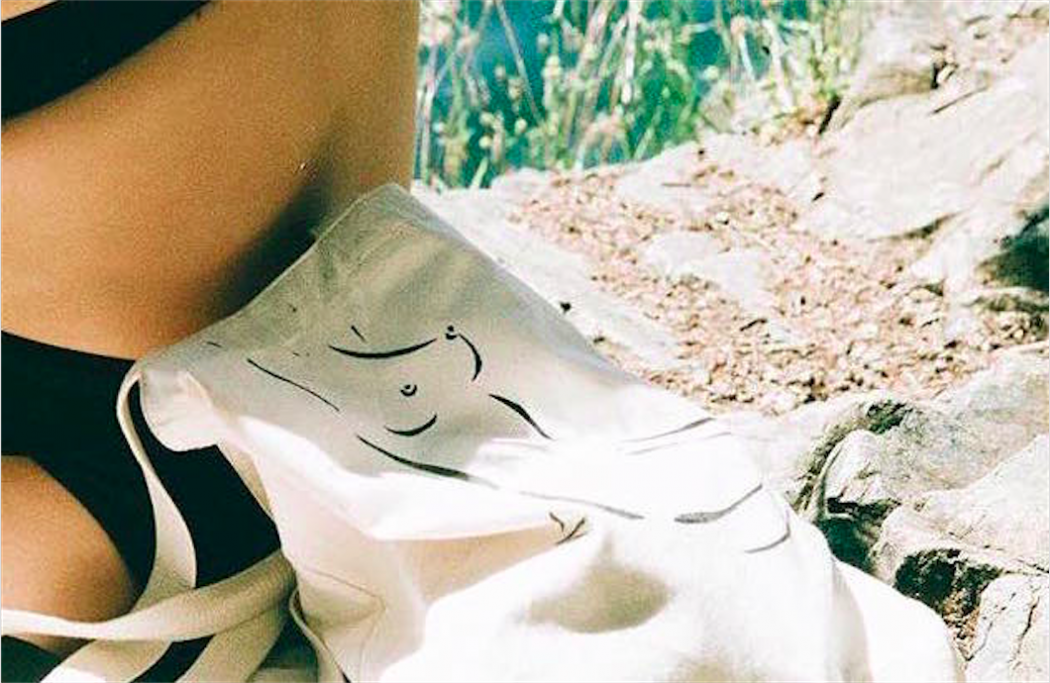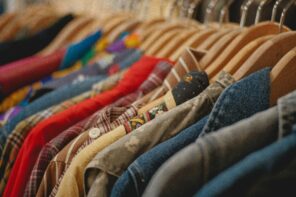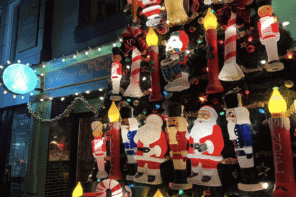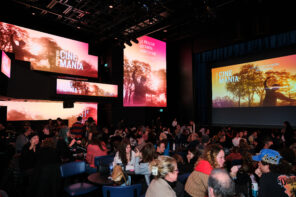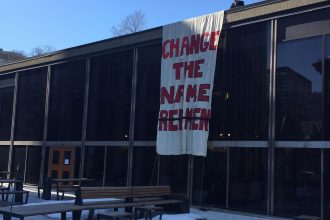Tackling the themes of female representation in fashion, as well as the benefits and downfalls of social media, the commodification of art, and the social discourse surrounding the aesthetic of the human body is… difficult to say the least. While many of these themes are usually represented through impassioned discourse, sometimes all it takes is a few probing questions concerning a naked silhouette on a tote bag, and everything comes to the surface. Around six months ago, University of Victoria students Nicole Taiji and Emma Powell cofounded the growing clothing line Peau Nue. The brand marries Nicole’s art and skill in screen printing with Emma’s meticulous eye for marketing and entrepreneurial drive for forward momentum. While the garments Nicole and Emma produce stand alone as impressive, the dynamic they create and the ideals they open up to the public are inspiring. Appropriately, the friendship and its extending partnership that these two share is just as beautiful and resilient as the female bodies their work honours. The Bull & Bear had the chance to sit down with them for a brief time and discuss their ever growing clothing line.
Bull & Bear (B&B): Walk us through the beginning of Peau Nue. How did you two go from being friends to business partners?
Nicole: Basically, I took this printing course at Camosun College and I got really excited about it, I had never done any printing before, and I went home and started talking about it with Emma. At first she was just modelling the clothes for me, but then eventually I wanted to curate the Instagram, and I am just bad at that, so I gave it to her. I always kind of wanted to have a business with Emma; we were always joking about opening up a coffee shop or some form of store together. Emma is very bossy and gets things done, whereas I put things off to the last minute. I need someone like her to push me, and I am really happy she is here with me doing exactly that. Emma is also really good at communicating with people outside of our immediate circle and getting our voice out there. I am really bad at speaking up, especially because it is all my art and personal. I sometimes feel weird asking if someone wants to carry our stuff or not.

B&B: To follow up on that, during the progression of making these designs into a small business, you had to make a certain leap. You had to look at what you were doing and assume that others would find value in this. Was that a hard transition?
Emma: I think when it started it was a lot of me saying Nicole, people like it, people really like it, and even though she knew that people liked it she just thought that they were only being supportive because they were all our friends. Finally, when we started the Peau Nue account, someone that we didn’t know bought one of our shirts, and both Nicole and I thought maybe… I don’t know maybe people actually like it.
Nicole: It was really hard, but as soon as someone outside of our network showed interest we thought maybe there was actually a market for this, outside of just people trying to support me, and that’s when we started talking about maybe actually doing something with this.
B&B: There are a lot of things to draw in this world, why the naked female form?
Nicole: For me personally, even with previous painting and drawing, I’ve always been fascinated by the female form and have been drawn towards painting naked ladies. And then with the printing course that, I took I found it really cool, because every time I tried to paint the human body I was trying to make it perfect, and with printing I was able to do it more abstractly, and it looked quite beautiful.

B&B: It’s really interesting how you seem to gravitate towards drawing a really diverse range of bodies.
Emma: Yeah, I think that was always a big thing for Nicole. The forms that she was drawing were always diverse; we didn’t want to exclusively be drawing Kate Moss bodies all over the place, even though there is nothing wrong with that form, it’s just not inclusive by itself.
Nicole: All my friends have different bodies, and that was a big thing when I started to draw. I wanted to draw women that looked like the women I knew.
Emma: *laughing* Yeah there have definitely been some times where I am lying on the living room floor, naked, having Nicole paint me. It works.
B&B: There are also a lot of things you could have put these designs on, why clothing?
Emma: Fashion for us is so important, especially because I am so particular in what I wear and what I buy. Buying a new piece can be really exciting and even empowering, and I love the thought of being able to do that for someone else. Our clothes and the art aren’t like something you keep in the home or hang on your wall that is really private, our clothes are in the public sphere. It’s cool that it is kind of a risk and open to public perception and seeing other people’s reactions to it.
Nicole: Also its important to us that we put in on clothing that is open and available to all different body types. Maybe not everyone would want to hang my art up on their wall but if people want to wear it, they are open to do that. It’s all about how comfortable you are: if you want to wear it, wear it. I also love thrifting, so being able to print on vintage and incorporating the hunt into the process adds to the whole experience. It’s so fun to find this amazing piece, put your art on it, and turn it in to the perfect piece.
B&B: How important has Instagram been to how you make contacts/promote your brand?
Emma: So for us, Instagram has been crucial. We would not have been anywhere near where we are right now without it. It is unlike any other social media platform, or really any other media platform in general. Facebook is out of date and if you go on to an artist platform like Big Cartel it is still quite niche, since it is predominantly an artist’s platform that is appealing to an artist audience, so you can be missing out on other people outside of that group that might still be interested. What I like so much about Instagram is that even with hash-tagging or geo-tagging, you can find people’s pages so easily, and I think that has opened us up to a community that we would have missed otherwise, especially in the Victoria (British Columbia) market where it is so welcoming and open.
B&B: To follow up on the theme of Instagram, do you think there is tension in using a platform to promote a pro-femininity brand when it has shown to wreak havoc on how women’s bodies are perceived?
Emma: I really think you could say that about anything. I couldn’t speak to the entire world, but I think especially with women in fashion, fashion can be very highly empowering, but then you get up to couture, and it can turn to be classist, or not race and body inclusive. Ultimately, I think fashion is good or bad depending on how you use it. I think within a niche market you are opened up to being more inclusive, because you are not trying to impress the entire world, you are just trying to impress the people who want to come there to this space to enjoy what you have. So in one aspect, yes, I think there is a huge problem with social media and with curation in general because it is easy to get lost behind it. But ultimately I do think it is more dependent on how you use it. We do work to be inclusive and I hope that isn’t how we are doing it.
we are doing it.
B&B: In the bio of your Instagram account, it says your brand is “inspired by powerful women”. Why is this specifically a source of inspiration for you, and what makes a woman powerful?
Nicole: Powerful women to us … and sure there are a lot of icons that we do look up to … but what inspires us are the women in our lives: our mothers, our friends. We are surrounded by a group of just really empowering women and we are so fortunate to have them. Even between Emma and I, we have always felt that we are there to encourage and support each other, without competition or exclusion. In our friend group we are all so different, with different bodies as well as personalities, and we just want to celebrate all that. When I think of empowered women I think first of the women around us. It is more personal for me to draw inspiration from the women I know and love.
B&B: Clothing that showcases female nudity seems to be pretty in-style right now. Among other examples, Kendall Jenner put the simple “boob and nipple” shirt illustration on the map while also pushing a “free the Nipple” rhetoric that intersects with some feminist discourse. It is really hard to dissect trends; people are weird, but why do you think this has become trendy?
Emma: I think obviously with the mass popularization of feminism at its basest form is a huge part of that. Also along with women reclaiming their sexuality and embracing their bodies in a positive way, there is consequently this huge market that is created. I think that once something is mass produced you can lose some of the core principles that fed it in the first place, because you are appealing to a wider market, but in that you can also include a lot of different people in something that you started and believe in.

B&B: Have you gained anything really surprising from this journey so far? Have you learned anything you might not have expected?
Emma: Communication was the biggest thing we struggled with, both as friends and as business partners, but even though we haven’t been doing this long, only about six months really. We are meshing really well and we have grown so much together. Equally, we both bring to the table something that completes the other, and without that we wouldn’t be able to do this. Nicole and I are learning throughout this, and we are learning every single aspect of this because we do it all as a team. If we need photos, I become a photographer. If we need to model the clothing, we become our own models. If we need to make stock, we will stay up till 2am printing on the living room floor, cutting the stencils out by hand. We aren’t perfect and we are learning as we go, and I really like that. We just have to do it, so I guess we will figure it out.
End of Interview.
For more information on Peau Nue, please check out their curated Instagram page @peau_nue.
Author’s note: Emma and Nicole would love for you to check out the page of a fellow artisan and collaborator Cianda Bourrell of Hold and Carry (@holdandcarry), without whom their beautiful tote bags would simply not be possible. Emma and Nicole would also like to thank the beautiful women of Local Assembly Brick & Mortar (@local.assembly), a local business that thrives off carefully selected vintage clothing and a celebration of local artistry.

